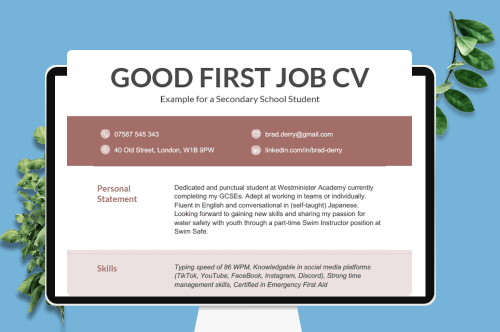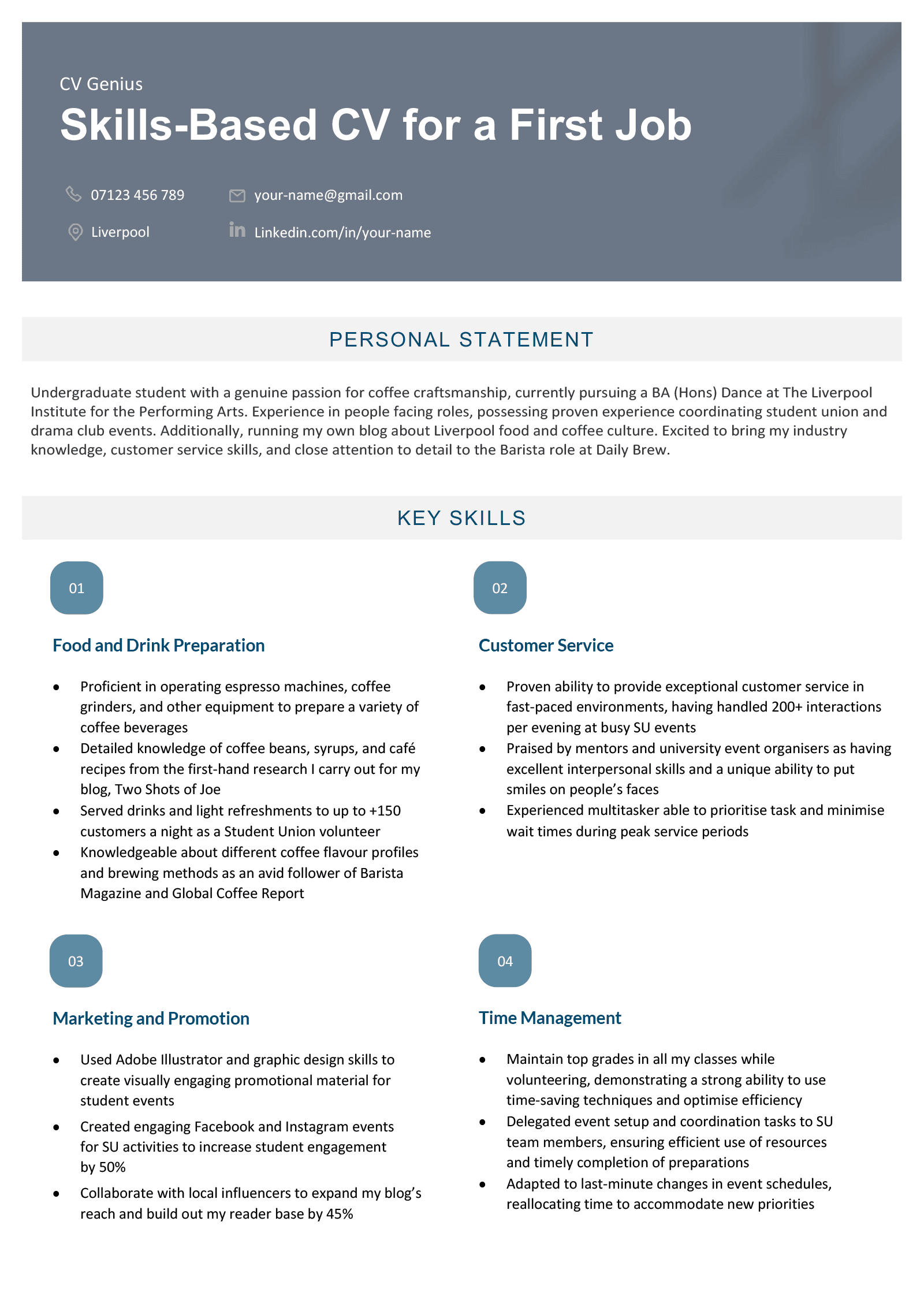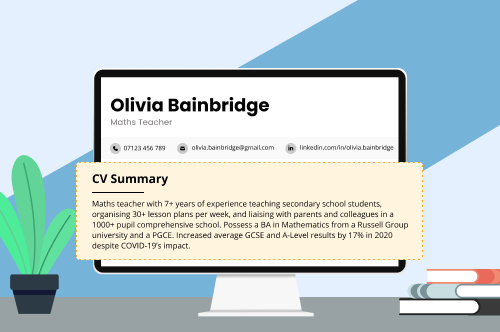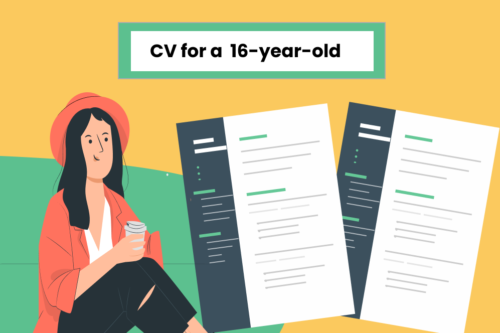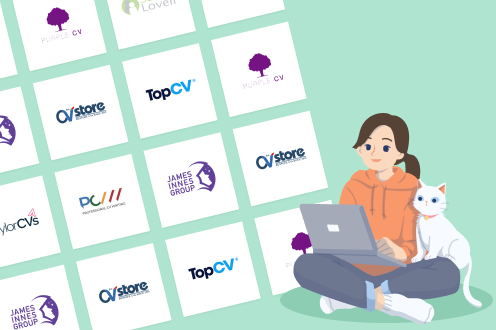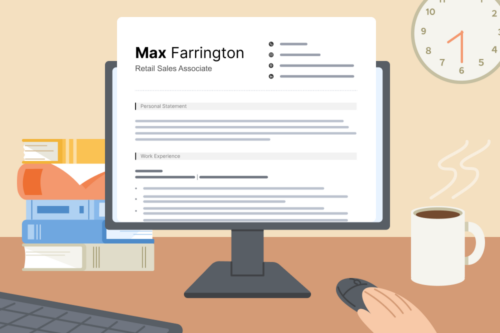Applying for your first job is an exciting time. But to get hired, you’ll need to write a CV that explains why you’re a great fit for the position.
Here are 3 good example CVs demonstrating how to write a winning application for your first job — plus a blank template you can download and personalise for free.
1. First-job CV example for a uni student
This uni student’s CV for a part-time job clearly outlines their career goals and social media expertise:
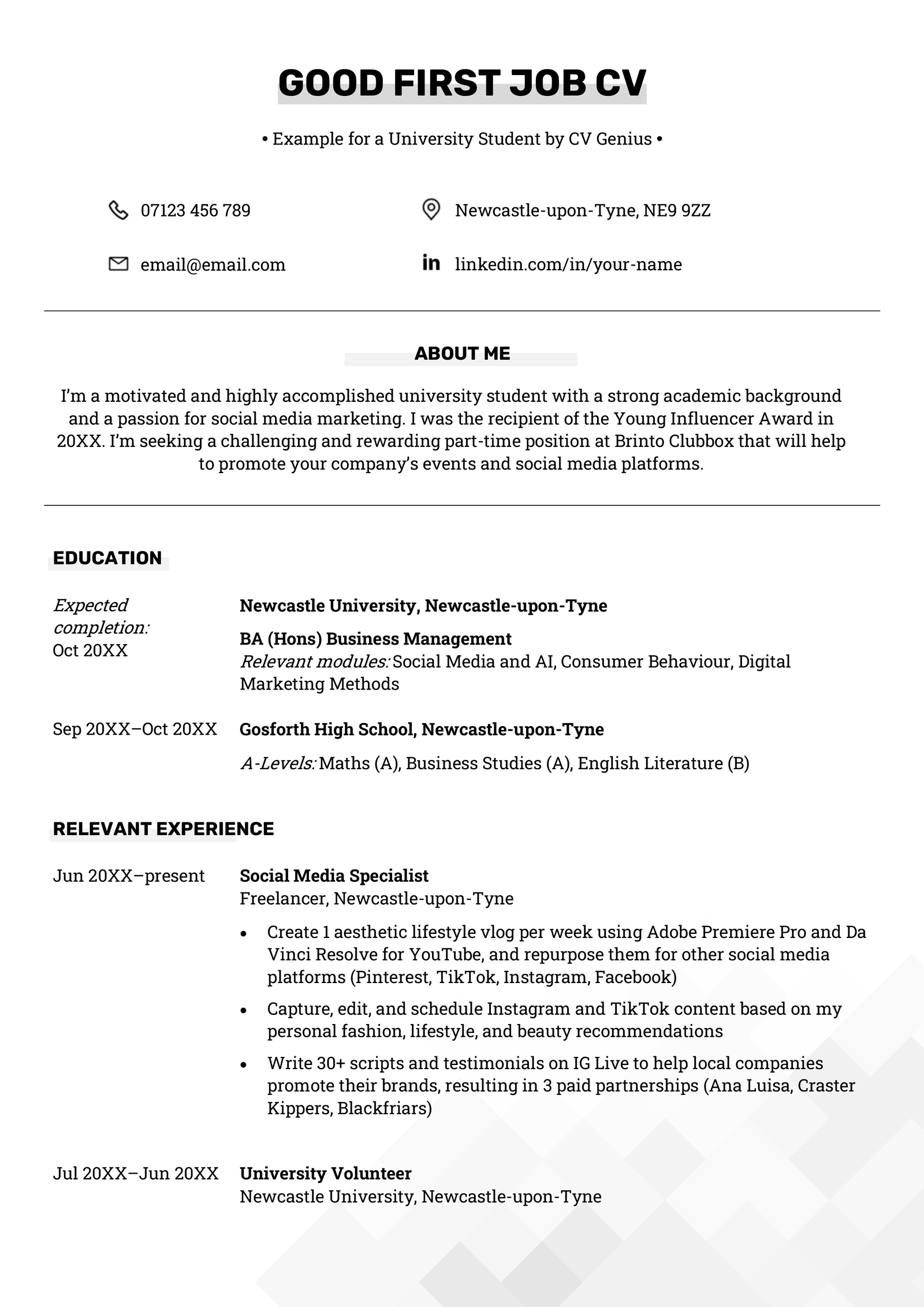
Uni Student CV (Text Version)
PERSONAL STATEMENT
Motivated and highly accomplished university student with a strong academic background and a passion for social media marketing. Recipient of the Young Influencer Award in 20XX. Seeking a challenging and rewarding part-time position at Brinto Clubbox that will help to promote your company’s events and social media platforms.
EDUCATION
Newcastle University, Newcastle-upon-Tyne, Sep 20XX–Oct 20XX
BA (Hons) Business Management — upper second-class honours (II.i),
Relevant modules: Social Media and AI, Consumer Behaviour, Digital Marketing Methods
Gosforth High School, Newcastle-upon-Tyne, Sep 20XX–Oct 20XX
A-Levels: Maths (A), Business Studies (A), English Literature (B)
GCSEs: 10 Grades 9–4 including Maths, English, and ICT
RELEVANT EXPERIENCE
Social Media Specialist, Jun 20XX–present
Freelance, Newcastle-upon-Tyne
- Create 1 aesthetic lifestyle vlog per week using Adobe Premiere Pro and Da Vinci Resolve for YouTube, and repurpose them for other social media platforms (Pinterest, TikTok, Instagram, Facebook)
- Capture, edit, and schedule Instagram and TikTok content based on my personal fashion, lifestyle, and beauty recommendations
- Write 30+ scripts and testimonials on IG Live to help local companies promote their brands, resulting in 3 paid partnerships (Ana Luisa, Craster Kippers, Blackfriars)
University Volunteer, Jul 20XX–Jun 20XX
Newcastle University, Newcastle-upon-Tyne
- Mentored 4 younger students with sketching backgrounds, simple pictures, and logos using Procreate
- Prepared informative PowerPoint presentations with simple, straightforward instructions on how to draw basic shapes and patterns
- Won the ‘Top Student Volunteer’ of the Month award in October 20XX
ADDITIONAL SKILLS
- Expert at using TikTok, Instagram, YouTube, and X for business purposes
- Proficient with Adobe Suite (Illustrator, InDesign, Photoshop, Lightroom)
- Bilingual in German and English
- Comfortable speaking and acting in front of the camera
- Excellent interpersonal, communication, analytical, and organisational skills
HOBBIES & INTERESTS
- Dancing
- Watching documentaries
- Playing tennis
Why this example works
This job applicant is writing a CV without formal work experience, so they include extra detail in their education section to outline the qualifications they do have. Furthermore, the applicant uses hard numbers to measure their previous successes, so the employer can clearly see the benefits they can bring to the company if hired.
2. Good first CV example for school leavers
This example CV for a 16-year-old includes volunteer experience and a prominent skills section to show the employer this applicant is ready for new responsibilities:
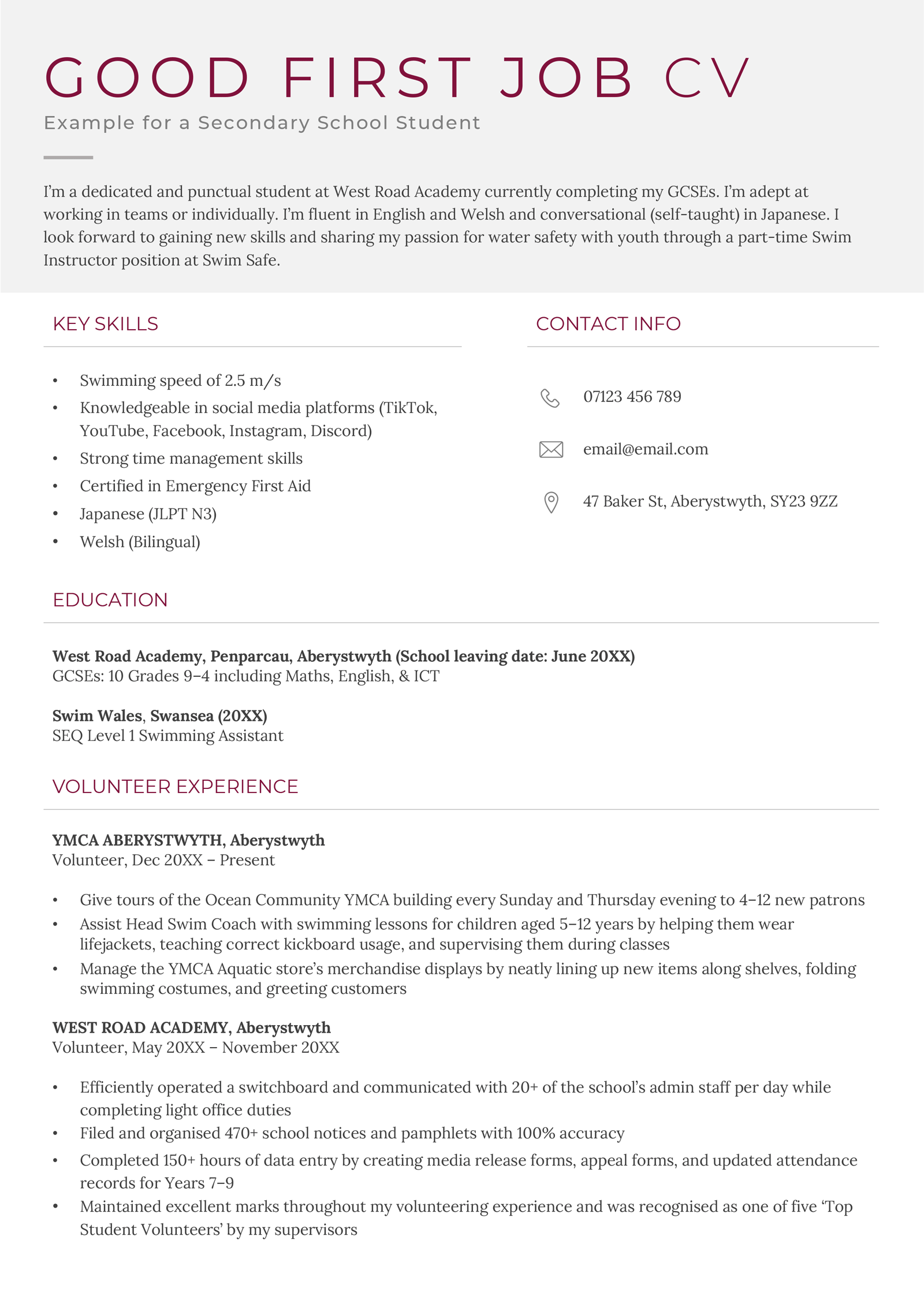
First-Job CV Example for a School Leaver (Text Version)
PERSONAL STATEMENT
Dedicated and punctual student at West Road Academy currently completing my GCSEs. Adept at working in teams or individually. Fluent in English and Welsh and conversational in (self-taught) Japanese. Looking forward to gaining new skills and sharing my passion for water safety with youth through a part-time Swim Instructor position at Swim Safe.
KEY SKILLS
- Typing speed of 86 WPM
- Knowledgeable in social media platforms (TikTok, YouTube, Facebook, Instagram, Discord)
- Strong time management skills
- Certified in Emergency First Aid
- Japanese (JLPT N3)
- Welsh (Bilingual)
EDUCATION
West Road Academy, Penparcau (School leaving date: June 20XX)
GCSEs: 10 Grades 9–4 including Maths, English, & ICT
Swim Wales, Swansea (20XX)
SEQ Level 1 Swimming Assistant
VOLUNTEER EXPERIENCE
YMCA Aberystwyth, Aberystwyth
Volunteer, Dec 20XX – Present
- Give tours of the Ocean Community YMCA building every Sunday and Thursday evening to 4–12 new patrons
- Assist Head Swim Coach with swimming lessons for children aged 5–12 years by helping them wear lifejackets, teaching correct kickboard usage, and supervising them during classes
- Manage the YMCA Aquatic store’s merchandise displays by neatly lining up new items along shelves, folding swimming costumes, and greeting customers
West Road Academy, Aberystwyth
Volunteer, May 20XX – November 20XX
- Efficiently operated a switchboard and communicated with 20+ of the school’s admin staff per day while completing light office duties
- Filed and organised 450+ school notices and pamphlets with 100% accuracy
- Completed 150+ hours of data entry by creating media release forms, appeal forms, and updated attendance records for Years 7–9
- Maintained excellent marks throughout my volunteering experience and was recognised as one of five ‘Top Student Volunteers’ by my supervisors
HOBBIES & INTERESTS
- Sports: Rambling, playing rugby, and weightlifting
- Music: Amateur violin, ukulele, and piano player
- Photography: Taking portraits of friends and family
Why this example works
This secondary school student might have only just finished their GCSEs, but they do a great job of showcasing their relevant strengths.
The bulleted key skills section quickly draws the eye to their first aid training, and they’ve included a relevant instructing certification to highlight their commitment to the swimming teacher role they’re applying for.
3. Skills-based CV for a first job
This skills-based CV uses an unconventional format to emphasise the applicant’s relevant expertise:
Skills-Based CV for a First Job (Text Version)
PERSONAL STATEMENT
Undergraduate student with a genuine passion for coffee craftsmanship, currently pursuing a BA (Hons) Dance at The Liverpool Institute for the Performing Arts. Experience in people facing roles, possessing proven experience coordinating student union and drama club events. Additionally, running my own blog about Liverpool food and coffee culture. Excited to bring my industry knowledge, customer service skills, and close attention to detail to the Barista role at Daily Brew.
KEY SKILLS
Food and Drink Preparation
- Proficient in operating espresso machines, coffee grinders, and other equipment to prepare a variety of coffee beverages
- Detailed knowledge of coffee beans, syrups, and café recipes from the first-hand research I carry out for my blog, Two Shots of Joe
- Served drinks and light refreshments to up to +150 customers a night as a Student Union volunteer
- Knowledgeable about different coffee flavour profiles and brewing methods as an avid follower of Barista Magazine and Global Coffee Report
Customer Service
- Proven ability to provide exceptional customer service in fast-paced environments, having handled 200+ interactions per evening at busy SU events
- Praised by mentors and university event organisers as having excellent interpersonal skills and a unique ability to put smiles on people’s faces
- Experienced multitasker able to prioritise task and minimise wait times during peak service periods
Marketing and Promotion
- Used Adobe Illustrator and graphic design skills to create visually engaging promotional material for student events
- Created engaging Facebook and Instagram events for SU activities to increase student engagement by 50%
- Collaborate with local influencers to expand my blog’s reach and build out my reader base by 45%
Time Management
- Maintain top grades in all my classes while volunteering, demonstrating a strong ability to use time-saving techniques and optimise efficiency
- Delegated event setup and coordination tasks to SU team members, ensuring efficient use of resources and timely completion of preparations
- Adapted to last-minute changes in event schedules, reallocating time to accommodate new priorities
EDUCATION
The Liverpool Institute for the Performing Arts
BA (Hons) Dance, 20XX–20XX, Liverpool
Merseyside Sixth Form College
2004– 2007, Limerick, Ireland
A Levels: Drama (A), English Lit. (A), Art (B)
EXTRACURRICULAR EXPERIENCE
SU Volunteer, 20XX–20XX
LIPA Student Union, Liverpool
HOBBIES & INTERESTS
- Watching nature documentaries
- Playing football on a weekly basis
- Reading non-fiction books
- Solving puzzles
- Fishing
Why this example works
When you’re applying for your first job with no practical experience at all, traditional CV formats only draw attention to your lack of a work history.
So this example focuses on skills to demonstrate the applicant’s broad practical knowledge and their passion for the role.
Applying for your first job in India? Look for fresher CV templates online or adapt a CV template with a photo to meet Indian application requirements and give yourself the best chance of landing your target role.
Bonus: Blank first-job CV template
Ready to start writing? Here’s a blank CV template you can edit with your own information.
Or if there’s a different CV design you’d rather use instead, we’ve left a plain text version below that you can copy-paste into your word processor.
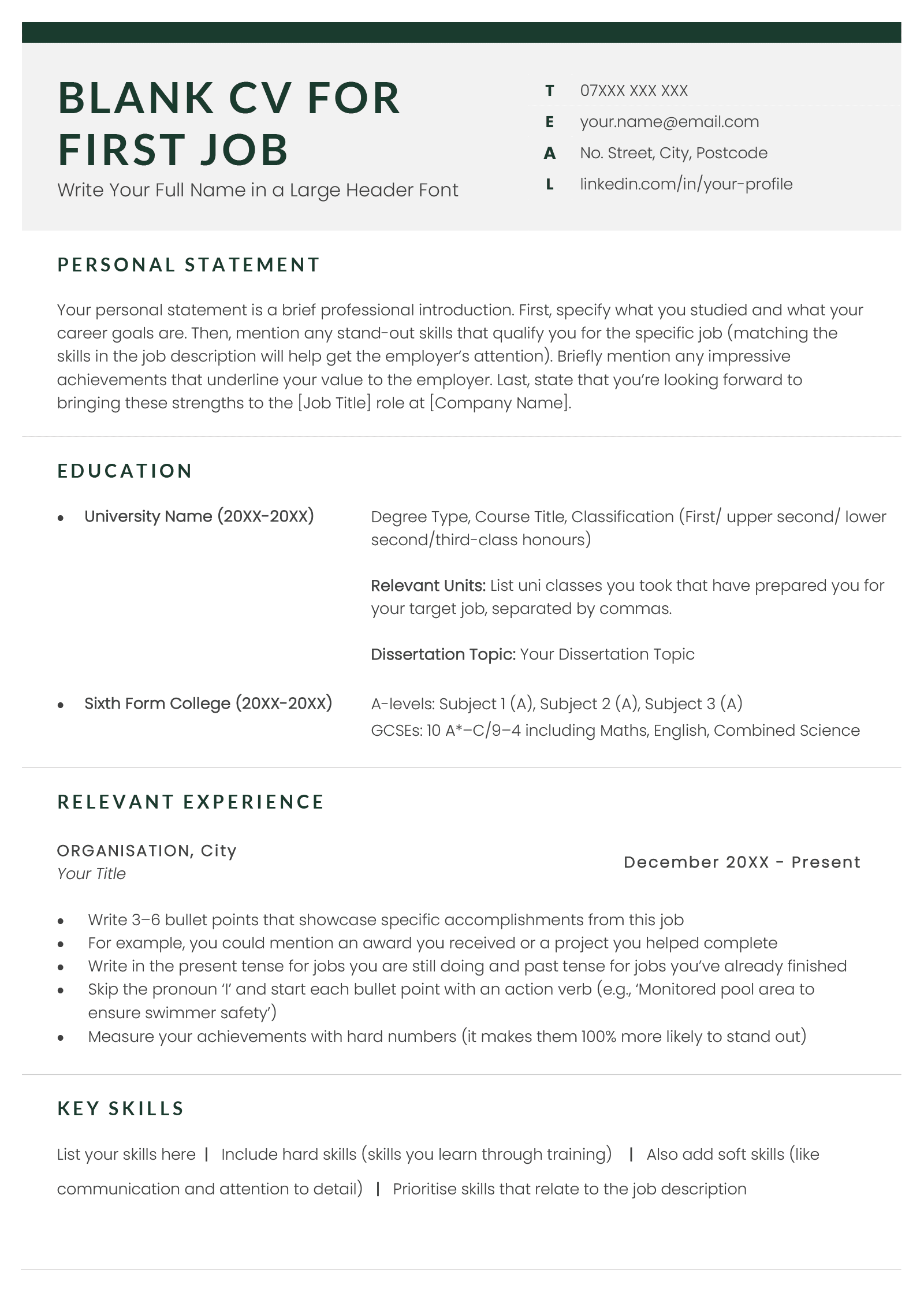
Different industries have different standards for CVs. Make sure you’re meeting employer expectations by checking job-specific CV examples and writing tips.
Frequently asked questions about writing a CV for your first job
Here are some answers to the most commonly asked questions about writing your first CV:
1. Can I write a good first CV even if I have no experience?
Yes, you can write a good CV even if you have no experience. Most employers understand that everyone has to start somewhere, so don’t worry too much if you haven’t had a formal job before.
As long as you prove in your CV that you understand the role, possess relevant skills, and are eager to learn, you’ll have a good chance of finding full-time work in the field you want.
If you don’t have any formal work experience, consider including other areas that demonstrate your work ethic and transferable skills, such as:
- internships
- volunteering experience for your CV
- academic awards
- relevant coursework
- extracurricular activities in your CV
- hobbies and interests
2. Can I write my first CV using Google Docs?
Yes, you can write your CV using Google Docs (using a predesigned Google Docs CV template if you want). Just remember to download your CV as a PDF file when you’re done. Sending an employer a finalised PDF looks more professional than a link to an online document.
3. What should I write in my CV for my first job?
Here’s what you should include in your first CV:
- Personal statement — a brief summary of your top skills, achievements, and expertise
- Education history — a list of your most relevant qualifications starting with the highest one
- Relevant experience — a history of any practical experience that has prepared you for the job (e.g., volunteer work, extracurricular activities, projects, and competitions)
- Key skills — a quick summary of any hard skills and soft skills that you want the employer to take notice of
- Hobbies and interests — an optional section where you can list any interesting pursuits unrelated to your career
And you can add all of this information in minutes using a CV builder.
4. Should I also write a cover letter for a first job?
Yes, you should also write a cover letter that complements your CV if you’re applying for a first job. A good cover letter will:
- introduce you to the employer and explain why you’re interested in the position and the company
- give you an opportunity to showcase your skills and experiences in a more personal way
- convey your enthusiasm and motivation for the role you want
View cover letter examples online to learn strategies for writing a standout cover letter for your first job.
Additional FAQs related to making your first CV
These are more FAQs to help you write a CV that’ll catch an employer’s attention — even if you don’t have any work experience yet:
